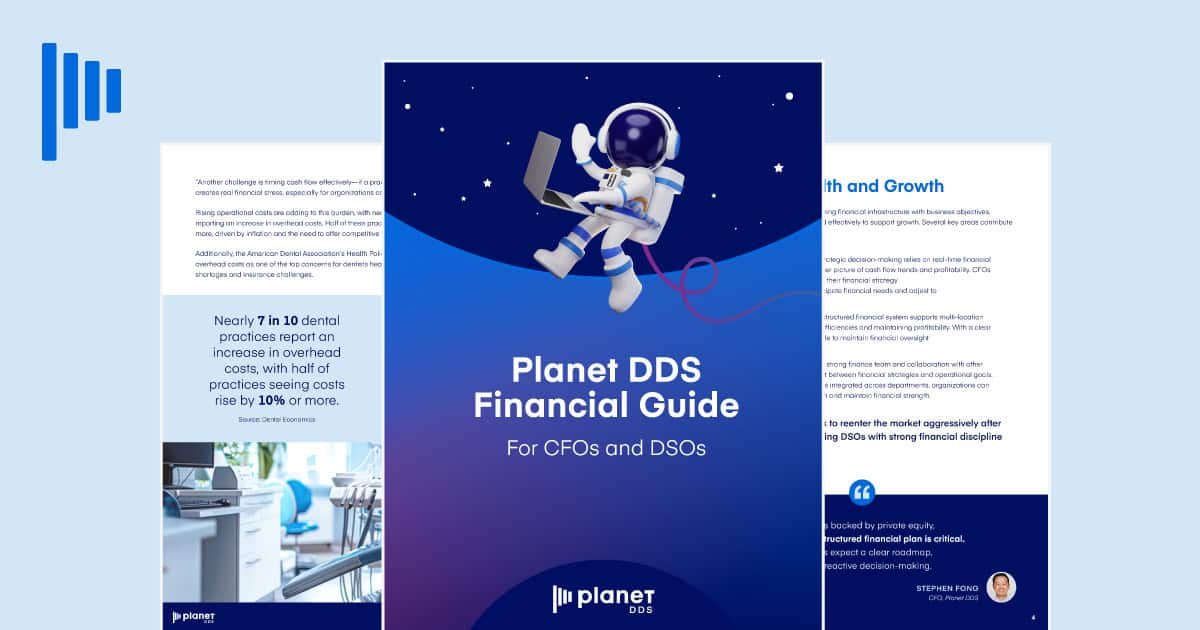How APIs Are Revolutionizing DSOs

As dental service organizations (DSOs) expand and scale operations, interoperable technology solutions have become increasingly important. Managing multiple locations and improving patient care requires the ability to connect systems like practice management software and imaging platforms efficiently. Other areas such as revenue cycle management (RCM) or analytics have significant opportunities to improve efficiency. This is where APIs (application programming interfaces) come into play.
APIs offer a powerful solution to integrate dental software, allowing DSOs to enhance workflows, improve operations, and elevate patient experiences. In this guide, we’ll explore how APIs are reshaping the dental industry, focusing on the benefits for organizations and best practices for successful adoption.
What Are APIs and Why Do They Matter for DSOs?
APIs enable software systems to communicate and share data effortlessly without manual work by humans, thanks to a programmatic integration between applications. For DSOs managing operations across multiple locations, APIs provide the interoperability needed to manage and synchronize information across the entire organization.
As your DSO continues to grow, implementing an API solution is necessary to drive business and financial success. According to the 2024 State of API Report, 40% of respondents indicated that a business-oriented approach is guiding API development, with a focus on increasing revenue and nurturing external partnerships.
How Do APIs Really Work?
APIs act as intermediaries between different software applications, facilitating communication and data exchange. They define a set of rules and protocols that enable one application to request specific data or actions from another.
These APIs permit disparate systems—like practice management, billing, and RCM tools—to share relevant information efficiently. For instance, when a new appointment is scheduled, the API can trigger updates across multiple platforms simultaneously, ensuring that each system reflects the latest information without the need for manual input. This real-time data synchronization enhances operational efficiency by providing DSOs with immediate access to up-to-date information.
Open APIs take this a step further by permitting third-party developers to access certain features or data of an application. This openness enhances collaboration among software vendors, leading to customized integrations that enable DSOs to strengthen their technology stack and improve overall system functionality.
10 Key Benefits of APIs in Dental Software
Within your DSO’s complex technology ecosystem—spanning practice management platforms, imaging systems, and more—APIs act as connectors, driving data flow between systems through read and writeback capabilities. Here’s how APIs can benefit your business:
1. Data integration
APIs enable different software platforms to share patient data, insurance eligibility data, and patient appointment information. This ensures data integrity for the entire organization.
2. Automated workflows
By automating routine processes such as verifying insurance eligibility and syncing patient data, APIs minimize manual work and reduce the likelihood of errors. This frees up valuable time for your staff so they can focus on patient care and other priorities.
3. Improved efficiency
Automation through APIs reduces delays caused by manual data entry. Real-time updates ensure all systems remain synchronized so your organization can streamline operations and maintain efficiency across all locations.
4. Imaging integration
Dental imaging software can be integrated directly with patient health records via APIs, allowing clinicians to access and review images within the same system. The result is better treatment planning and more efficient workflows.
5. Custom tech solutions
APIs provide your DSO with the flexibility to build a customized technology stack. You can integrate the best software tools for your unique needs, ensuring compatibility without being restricted to a single vendor’s proprietary ecosystem.
6. Enhanced data security
Data security is a priority for organizations managing large volumes of sensitive patient information. APIs are built with robust security protocols that protect data during transfers between systems, adhering to compliance with regulatory standards like HIPAA.
7. Advanced analytics and reporting
With APIs, your teams can automatically pull data from multiple systems to generate comprehensive analytics and reports. This centralized data access empowers leadership to make informed, data-driven decisions to optimize performance across the organization.
8. Scalability and flexibility
As your organization continues to grow and add new locations or services, APIs give scalability by integrating new software solutions into the existing infrastructure. This allows for expansion without disrupting day-to-day operations.
9. Enhanced patient experience
By integrating patient portals, scheduling, and billing systems, APIs improve the overall patient experience. Patients benefit from easier access to services, such as online appointment booking and real-time access to medical records, leading to higher satisfaction.
According to a 2024 healthcare survey, 89% of patients strongly agreed that having the ability to schedule appointments anytime via online or mobile tools was of particular importance.
10. Better patient care
APIs provide DSOs with immediate access to reliable patient information across various systems, enabling them to provide a more customized patient experience. This timely and accurate data not only supports the patient journey but also drives patient retention.
How APIs Enhance Innovation in Practice Management
While APIs are critical for integration, they also serve as catalysts for innovation, helping DSOs adopt cutting-edge technologies and develop customized solutions. Here are some key areas where APIs enhance development within DSOs:
Integrating emerging technologies
APIs make it easier to incorporate advanced technologies like artificial intelligence (AI) and machine learning into practice management software. AI-powered diagnostic tools, for example, can analyze patient data in real time, offering insights that support treatment planning without interrupting existing workflows.
In a recent study with dental professionals, more than 70% stated that AI can be used as a treatment planning tool in dentistry while 60% agreed that AI can be a definitive diagnostic tool—and this number will likely increase as more DSOs utilize advanced practice management software and API solutions.
Customizing reporting solutions
Instead of relying on single-solution software, your DSO can use APIs to develop custom solutions that address specific operational needs. APIs facilitate the creation of tailored dashboards and reporting tools that pull data from multiple systems, providing deeper insights into operations.
Enhancing partner collaboration
APIs allow your organization to collaborate effectively with technology partners. By working closely with vendors, you can ensure that new tools integrate seamlessly with existing systems, accelerating digital transformation and catering to specific industry demands.
Expanding patient outreach
APIs help extend the reach of DSOs beyond traditional in-office care. Through the integration of telehealth platforms, mobile apps, and patient portals, services can be offered remotely, reshaping patient engagement and creating more touchpoints for patient care.
Best Practices for Choosing an API Solution
While integrating APIs into existing systems offers immense benefits, it can also present challenges. Selecting the right vendor from the start will ensure a smoother integration process. Here are some best practices to consider when evaluating API partners for your DSO:
1. Set realistic expectations.
Before choosing a practice management solution provider and API partners, clearly define its capabilities and limitations to ensure alignment with your current systems. It’s important to select a solution that can scale as your organization grows, preventing future operational issues.
2. Prioritize comprehensive documentation.
Clear, regularly updated documentation is essential for successful integration. Vendors who provide detailed examples, troubleshooting guides, and developer support can simplify the process and help prevent technical issues during setup.
3. Test for scalability and performance.
APIs should be tested under real-world conditions to confirm they can handle operational demands, especially during peak usage. Scalability is crucial for ensuring that performance is maintained as your DSO expands its operations.
4. Evaluate security and compliance measures.
Security is a top priority when managing patient data. APIs must comply with healthcare regulations like HIPAA and include robust encryption protocols to guarantee that data transfers are secure. Regular security updates are also necessary to protect against emerging threats.
5. Understand the full cost of ownership.
Hidden costs associated with APIs, such as fees for advanced features or additional data access, can affect budgets. Assess the total cost of ownership, including potential expenses for maintenance and future updates, to avoid unexpected financial surprises.
6. Look for customizable solutions for multi-locations.
When selecting an API program, make sure it addresses the unique challenges of your multi-location operation and supports the development of customized solutions to optimize your business.
For programs like Planet DDS API, innovation should be at the forefront: “Planet DDS API enables organizations to collaborate with partners and customize their technology to meet unique needs, ensuring they can future-proof their operations in a rapidly changing industry effectively,” explained Eric Giesecke, CEO of Planet DDS.
Transform Your DSO with API Solutions
API are revolutionizing how modern DSOs operate, enhancing patient care and streamlining processes. These tools facilitate information exchange across systems and empower your organization to innovate in response to evolving industry demands. By using APIs, you can improve decision-making and operational efficiency, positioning your DSO for sustained success.
As the industry advances, selecting the right API partner is essential for overcoming challenges and seizing opportunities. Adopting these technologies enables you to create tailored systems that meet your unique needs and propel your business forward.
To find out how Planet DDS can elevate your dental practice management solutions and API capabilities, contact us today.



